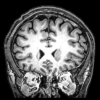It may not actually BE dopamine supersensitivity - it may well be your cholinergic system being allowed to go haywire - dopamine and acetacholine works in a sort of see-saw with each other, that's why ANTICHOLINERGIC DRUGS are sometimes used to treat the side-effects from Antipsychotics.
The fact that Nicotine, an ACETACHOLINE AGONIST worsens your symptoms, may be an indicator of this.
Just some food for thought... Check out some of the data on this, and the relationship between dopamine/acetacholine and the history of treating antipsychotic side-effects.
With that said, if increasing the dosage of Olanzapine helps, then it's more likely to be dopamine - HOWever... I just saw that Olanzapine as a matter of fact, is a dose-dependent powerful anticholinergic! So, choline isn't out of the realm of possibility either.
In order to test if it's choline, I recommend you get a hold of an acetacholine-increasing substance - if it gives you symptoms, then you know that might be a factor as well. I recommend Alpha-GPC (there are multiple brands, pick and chose from the trusted vendors).
In closing, what two antipsychotics have you been on? Apparently there are statistical differences in how the different Antipsychotics induce akathisia, wherein Quetiapine and Clozapine are cited as the least likely to cause it. Perhaps you can just switch to these two, and have the symptoms improve gradually?
References:
-----------------
Anticholinergics for neuroleptic-induced acute akathisia.
https://www.ncbi.nlm...pubmed/14974032
(admittedly, the above review came to the conclusion that the effects are... inconclusive, more testing is necessary, for ACUTE akathisia that is - possibly it would help long-term)
Acute antipsychotic-induced akathisia revisited
(once again, this is acute, not gradual akathisia with prolonged use, so take that into consideration)
For clarification, which cholinergic system is a seesaw with dopamine and which cholinergic system do antipsychotics affect? The muscarinic and/or the nicotinic?
Not all antipsychotics are anticholinergic to an appreciable extent, only some - in general, from what I've seen, it appears to be the classic Muscarinic type antagonism.
Good question though! You made me read up closer on this, and actually give it some thought - made me realize how it's one of those things I've heard a million times, but never seen a big explanation of it.
It seems to depend on which part of the brain we're talking about here... as is often the case, it seems to be a bit of a simplification, to say they are in a "perfect see-saw".
There at least seems to be an interplay between D2 and D5 receptors, and M1 and M2 (muscarinic, obviously) receptors - in the case of Parkinsons disease, it seems to be as if Dopamine is necessary for a feedback-loop which inhibits Acetylcholine release - and when there's not enough Dopamine, because of depletion, ACH reaches such levels that the shaky motor behaviour starts appearing.
Acetylcholine-dopamine balance hypothesis in the striatum: an update.
https://www.ncbi.nlm...pubmed/20590830
In Parkinson's disease, dopamine depletion blocks autoinhibition of acetylcholine release through muscarinic autoreceptors, leading to excessive acetylcholine release which eventually prunes spines of the indirect-pathway projection neurons of the striatum and thus interrupts information transfer from motor command centers in the cerebral cortex.
It's not just a relationship based on these receptors though, but there seems to be an actual plasma-level relationship, since Choline-supplements causes decrease of dopaminergic signalling.
Effects of CDP-choline on striatal dopamine level and behavior in rats.
https://www.ncbi.nlm.../pubmed/7253343
(the article is 35 years old though, and considers rats... so, don't give it too much credit)
A similar effect, except... sort of reversed? Is seen with suppression of dopaminergic signalling from the use of antipsychotics - Tardive Dyskinesia, as its called. I believe there used to be a use of anticholinergics in the past to treat it... but I'm also finding references that it appears as if use of anticholinergics may actually make it worse!
Anticholinergic medication for neuroleptic-induced tardive dyskinesia
http://onlinelibrary...000204/abstract
The Nicotinic acetylcholine receptors appear to be more diverse in their reactions here, sometimes enhancing the effects of dopamine. But there appears to be an impairing effect as well... It's a bit hard to grasp, I must admit!
Nicotinic acetylcholine receptors interact with dopamine in induction of striatal long-term depression.
https://www.ncbi.nlm...pubmed/11923419
Dopamine release is modulated by activation of nicotinic receptors in the dorsal striatum, and activation of nicotinic receptors during high-frequency synaptic activation appears to be capable of interacting with dopaminergic actions that lead to striatal LTD.
(long-term depression above refers not to the disease depression, but to the process in which LTP - Long-term Potentiation, ak a learning, is stopped at the right moment to allow for encoding of new memories and knowledge - without LTD, LTP is useless)
https://en.wikipedia...term_depression
So... a complicated question, which I apparently don't quite know the answer to... Sometimes, it really does seem to be a see-saw, while sometimes, it's more of a coexistence and high levels of both are necessary.















































